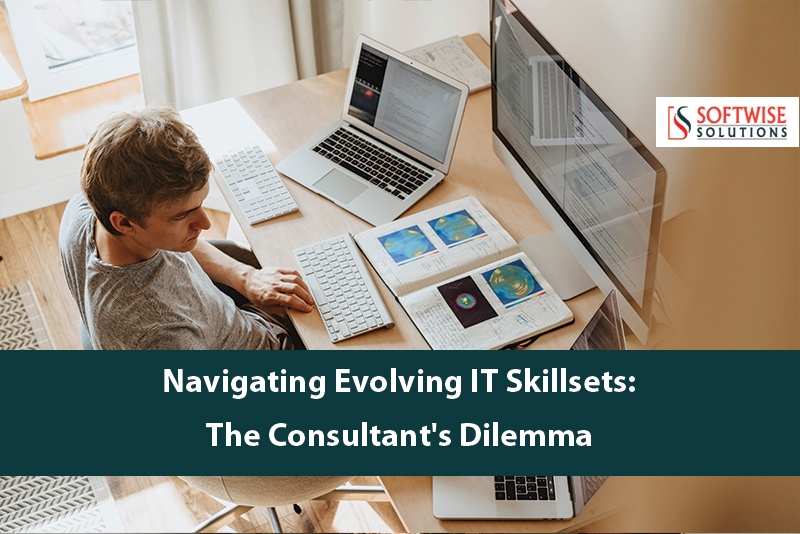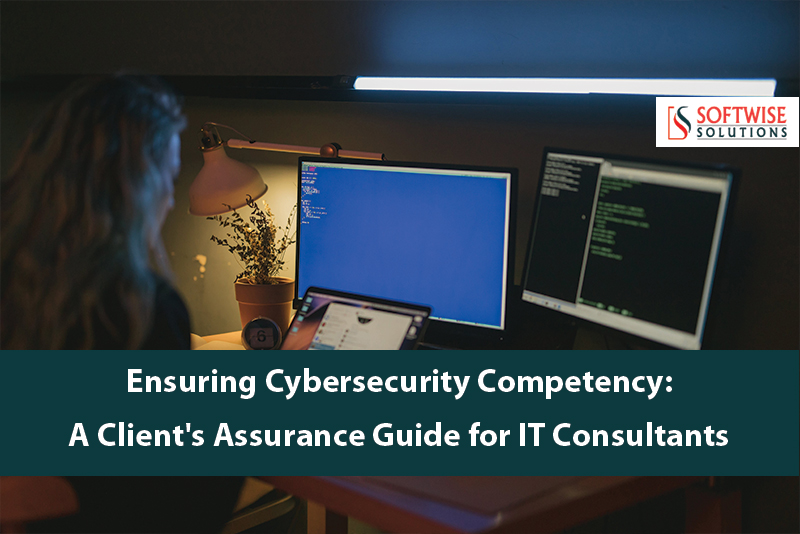In the fast-paced realm of Information Technology (IT), the only constant is change. The perpetual evolution of technology brings about a unique set of challenges and opportunities, especially for IT consultants. As organizations strive to stay ahead in a digital landscape that is ever-expanding, the dilemma faced by IT consultants in navigating evolving skillsets becomes increasingly critical. This blog explores the multifaceted aspects of this dilemma, shedding light on common mistakes, fears, and the desires that shape the journey of IT consultants in mastering the art of staying relevant in a dynamic industry.
The Dynamics of IT Skillsets
- Not Staying Updated on the Latest Technological Trends and Tools:
- Embracing new technologies is pivotal in the IT consultancy landscape. Continuous learning and staying informed about emerging trends are essential to avoid becoming outdated.
- Solution: Establish a culture of continuous learning within your consultancy. Encourage consultants to attend workshops, webinars, and pursue certifications to keep their skills sharp and up-to-date.
- Overlooking the Importance of Soft Skills in Addition to Technical Proficiency:
- While technical expertise is crucial, overlooking the significance of soft skills is a common oversight. Effective communication, problem-solving, and adaptability are integral to a consultant's success, and neglecting these aspects can hinder professional growth.
- Solution: Implement training programs focusing on enhancing soft skills. Foster a collaborative environment that values effective communication, teamwork, and the ability to adapt to diverse client needs.
- Failing to Adapt to Emerging Technologies and Methodologies:
- In the fast-changing IT landscape, resistance to change can be detrimental. Some consultants resist adapting to new technologies and methodologies, clinging to outdated practices. This can limit their ability to provide innovative solutions to clients.
- Solution: Foster a culture of innovation within your consultancy. Encourage consultants to experiment with new technologies, attend industry conferences, and collaborate on projects that push the boundaries of traditional approaches.
- Becoming Obsolete in the Industry Due to Outdated Skills:
- The fear of becoming obsolete is a significant concern for IT consultants. The rapid pace of technological advancement can make skills obsolete quickly, and consultants fear being left behind if they don't continuously update their knowledge.
- Solution: Develop a structured career development plan that includes ongoing training and upskilling opportunities. Provide resources for self-paced learning and create a culture that values and rewards continuous improvement.
- Losing Job Opportunities to Tech-Savvy Competitors:
- In a competitive industry, the fear of losing job opportunities to tech-savvy competitors is prevalent. Consultants worry that clients and employers may opt for professionals with more diverse and updated skillsets, leaving them at a disadvantage.
- Solution: Encourage consultants to proactively seek opportunities to expand their skillsets. Showcase the consultancy's commitment to innovation, and position your team as dynamic and adaptable to attract clients seeking cutting-edge solutions.
- The Inability to Meet Client Demands for Cutting-Edge Solutions:
- Clients increasingly expect consultants to provide solutions that align with the latest technological advancements. The fear of being unable to meet these demands can create anxiety among consultants who feel pressure to constantly deliver innovative and cutting-edge solutions.
- Solution: Foster a culture of collaboration and knowledge sharing. Create cross-functional teams that bring together diverse expertise to tackle complex challenges. This approach ensures that consultants can collectively meet and exceed client expectations.
- Continuous Skill Development in Line with Industry Trends:
- IT consultants desire a pathway for continuous skill development that aligns with industry trends. The result is a consultancy with a workforce equipped with the latest tools, methodologies, and expertise, positioning them as leaders in the IT consulting space.
- Action Plan: Establish a structured training and development program that includes regular assessments of consultants' skills. Provide incentives for obtaining relevant certifications and staying updated on industry trends.
- Balancing Technical and Soft Skills for Holistic Consultant Profiles:
- A desire among consultants is to strike a balance between technical proficiency and soft skills. The result is a consultancy with well-rounded professionals who not only excel in technical domains but also communicate effectively, collaborate seamlessly, and adapt to evolving client needs.
- Action Plan: Implement a comprehensive training program that addresses both technical and soft skills. Encourage mentorship programs where experienced consultants can guide their peers in developing a holistic skillset.
- Being at the Forefront of Technology Trends to Meet Client Expectations:
- Consultants aspire to be at the forefront of technology trends, ensuring they can meet and exceed client expectations. The result is a consultancy that anticipates client needs, delivers innovative solutions, and maintains a competitive edge in the market.
- Action Plan: Foster a culture of curiosity and exploration. Encourage consultants to attend industry conferences, participate in hackathons, and contribute to open-source projects. Create an environment where staying ahead of technology trends is not just encouraged but celebrated.
- Skill Gaps Leading to Project Limitations:
- Consultants may experience frustration when skill gaps become apparent within the team, leading to limitations in tackling complex projects. This frustration can hinder project timelines and impact client satisfaction.
- Mitigation: Conduct regular skills assessments and provide targeted training to address identified gaps. Build a collaborative environment where team members can share knowledge and learn from each other.
- Losing Projects to Competitors with More Diverse Skillsets:
- Losing projects to competitors with more diverse skillsets is a common frustration. Consultants may feel demotivated when clients opt for competitors perceived as more adaptable and capable of delivering a wider range of services.
- Mitigation: Showcase the consultancy's commitment to continuous learning and innovation. Highlight success stories where the team's diverse skillsets have contributed to successful project outcomes. Position the consultancy as a partner that goes beyond technical excellence.
- Consultants Struggling to Meet Client Expectations:
- When consultants struggle to meet client expectations due to skill limitations, frustration ensues. This frustration can lead to strained client relationships, negative feedback, and potential damage to the consultancy's reputation.
- Mitigation: Provide consultants with the tools and resources needed to excel in their roles. Foster a client-centric mindset, emphasizing the importance of understanding and anticipating client needs. Conduct regular client feedback sessions to identify areas for improvement.
Mastering the Dilemma: A Holistic Approach to Skill Development
Navigating the evolving landscape of IT skillsets requires a holistic approach to skill development. IT consultants must not only focus on staying technically proficient but also prioritize soft skills, adaptability, and continuous learning. A successful consultancy is one that recognizes the challenges posed by evolving skill requirements and actively invests in its greatest asset – its people.
The Role of Leadership
Leadership within an IT consultancy plays a pivotal role in shaping the trajectory of skill development. Here are key actions leaders can take to guide their teams through the consultant's dilemma:
- Establish a Culture of Continuous Learning:
- Cultivate a culture where learning is not viewed as a one-time event but as a continuous journey. Encourage consultants to pursue certifications, attend workshops, and engage in self-directed learning.
- Provide Access to Resources for Skill Development:
- Ensure that consultants have access to resources such as online courses, training platforms, and industry publications. Invest in a robust library of learning materials that cover a broad spectrum of technical and soft skills.
- Foster Cross-Functional Collaboration:
- Break down silos within the consultancy by fostering cross-functional collaboration. Create teams that bring together individuals with diverse skillsets, enabling them to learn from each other and tackle projects from multiple perspectives.
- Celebrate and Showcase Success Stories:
- Highlight success stories within the consultancy where consultants' skill development efforts have directly contributed to positive project outcomes. This not only motivates the team but also showcases the consultancy's commitment to excellence.
- Prioritize Mentorship Programs:
- Establish mentorship programs where seasoned consultants mentor their peers. This facilitates knowledge transfer, provides guidance on navigating challenges, and fosters a sense of camaraderie within the consultancy.
The Consultant's Personal Responsibility
While leadership plays a crucial role, consultants themselves also bear a significant responsibility in mastering the dilemma. Here are actions individual consultants can take to navigate evolving IT skillsets effectively:
- Take Ownership of Your Learning Journey:
- Recognize that staying relevant in the IT industry requires personal commitment to continuous learning. Take ownership of your learning journey by setting goals, seeking out relevant resources, and actively pursuing skill development opportunities.
- Seek Diverse Experiences:
- Actively seek out diverse experiences that expose you to different technologies, industries, and project methodologies. Embrace challenges that may stretch your skillset and contribute to your overall growth.
- Build a Professional Network:
- Connect with professionals both within and outside the consultancy. Building a robust professional network provides opportunities for knowledge exchange, mentorship, and exposure to a broader range of perspectives.
- Embrace a Growth Mindset:
- Cultivate a growth mindset that embraces challenges as opportunities for learning and development. Understand that setbacks are a natural part of the learning process and use them as stepping stones to future success.
- Stay Informed About Industry Trends:
- Actively stay informed about the latest industry trends, emerging technologies, and best practices. Attend conferences, participate in webinars, and engage in online communities to stay at the forefront of IT developments.
Conclusion: Thriving in the Ever-Evolving IT Landscape
The consultant's dilemma in navigating evolving IT skillsets is a challenge that, when embraced and mastered, becomes a catalyst for growth and success. By avoiding common mistakes, addressing fears, and striving for desirable outcomes, both leadership and individual consultants can contribute to the creation of a consultancy that thrives in the ever-evolving IT landscape.
In conclusion, the ability to adapt, learn, and innovate defines the success of IT consultants in an industry where change is the only constant. By viewing the consultant's dilemma as an opportunity for continuous improvement, IT consultancies can position themselves as leaders in delivering cutting-edge solutions that meet and exceed client expectations.










